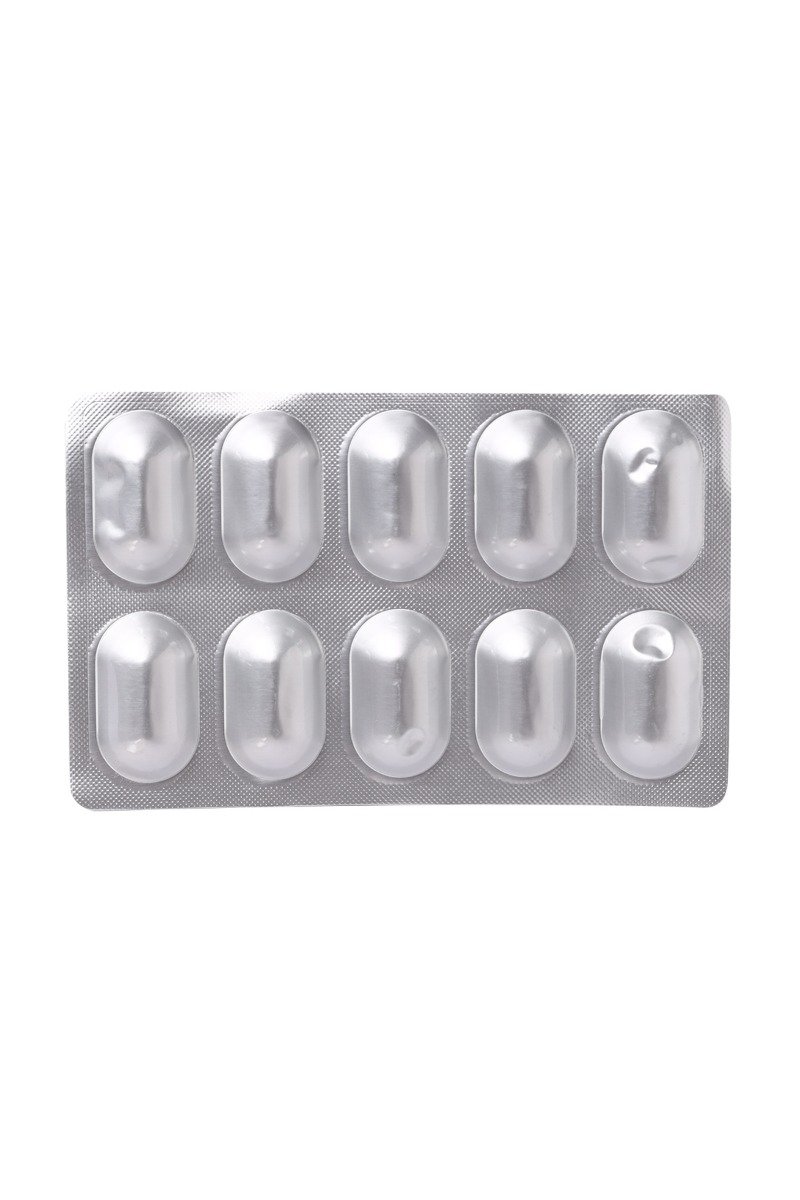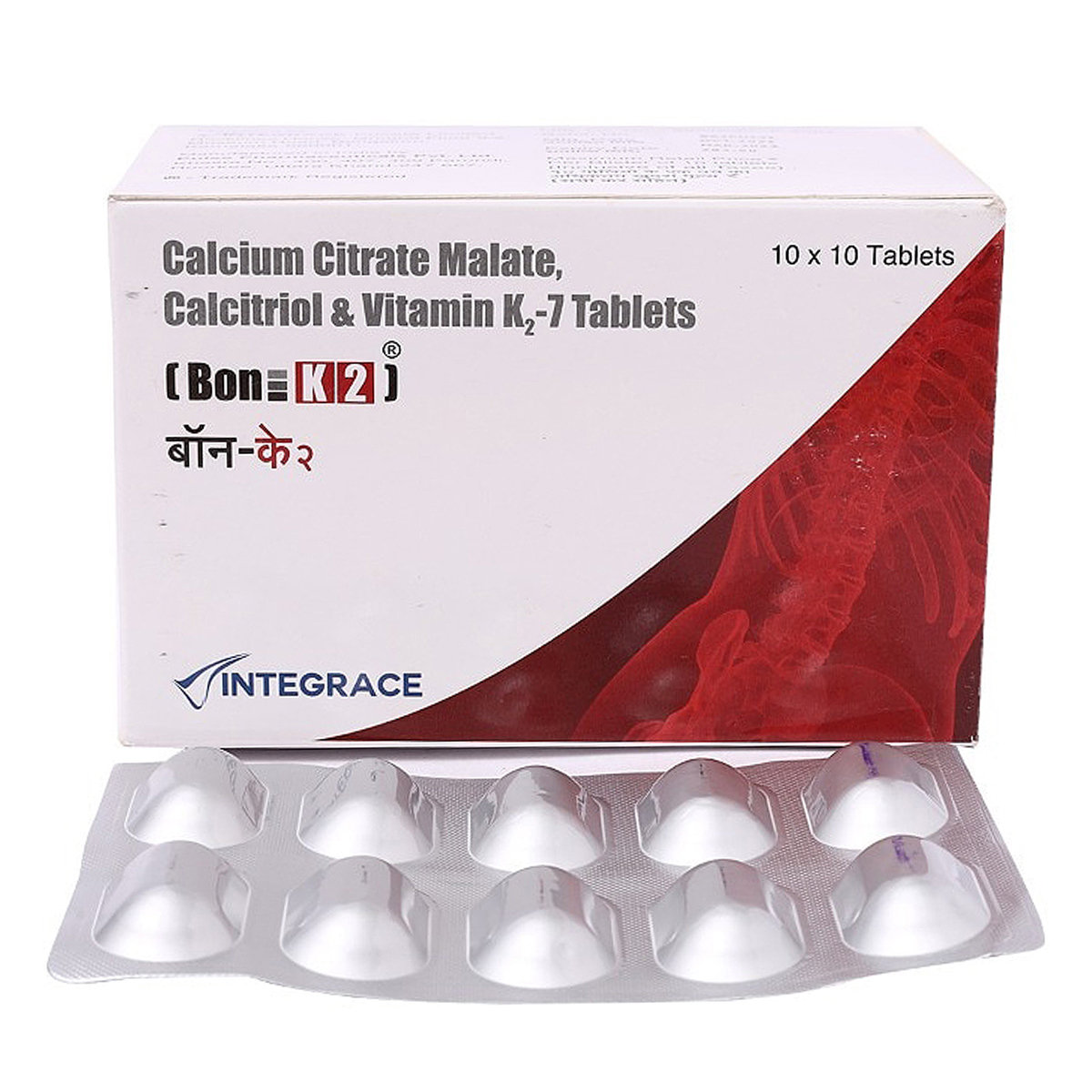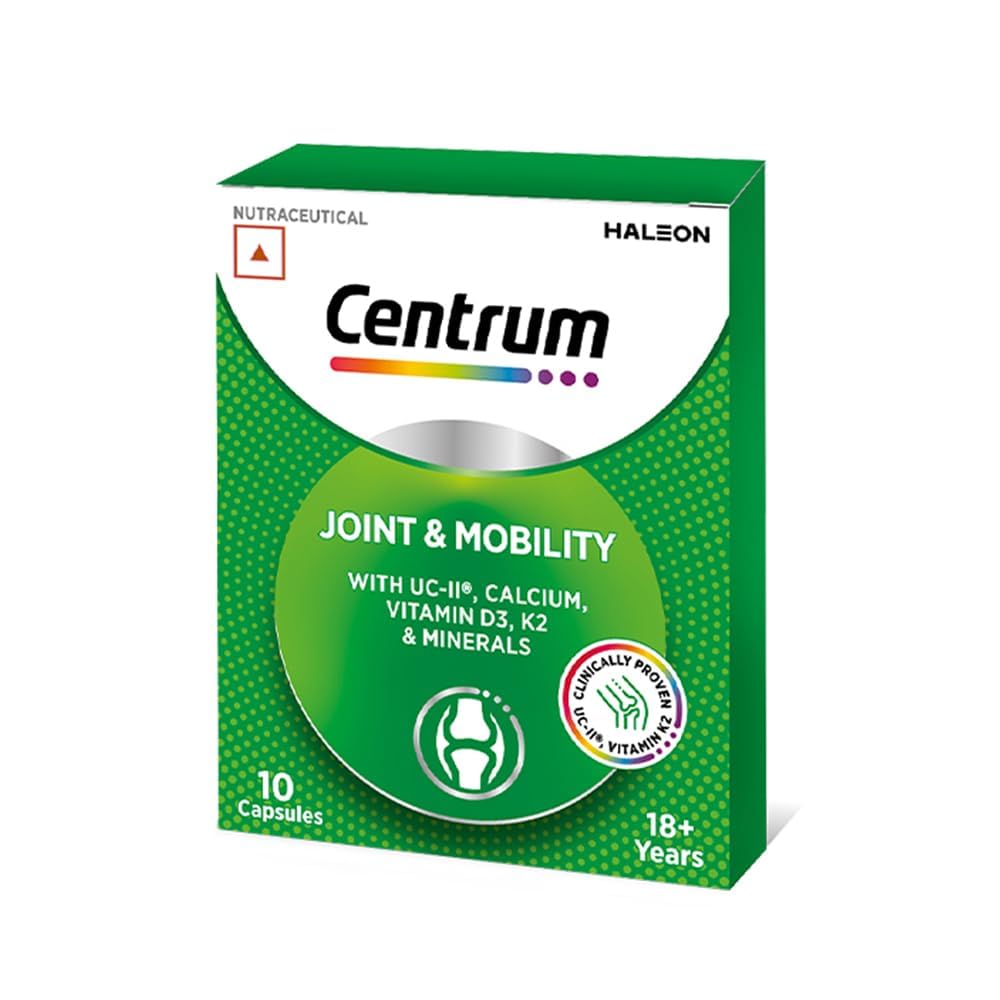MINOSTA TABLET
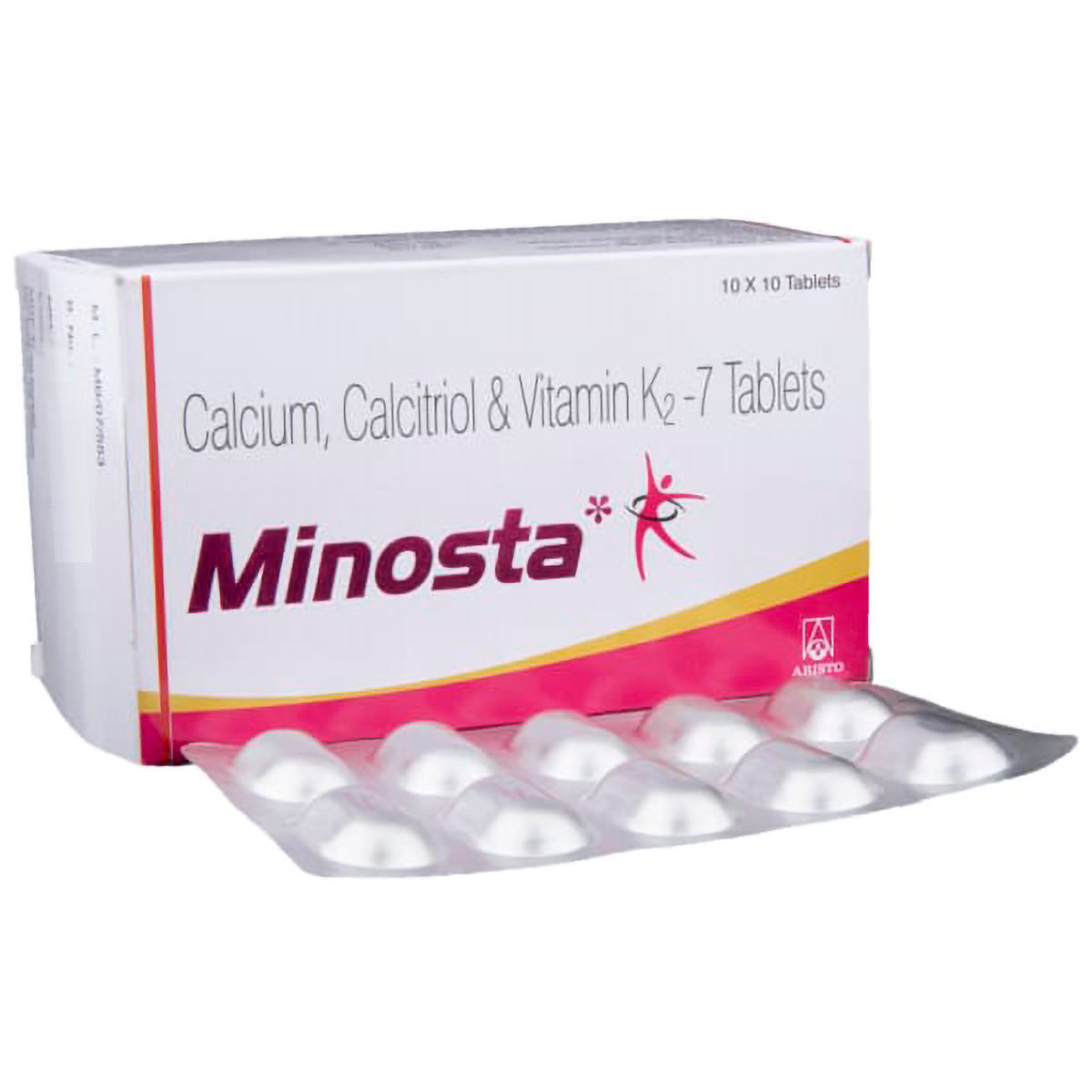
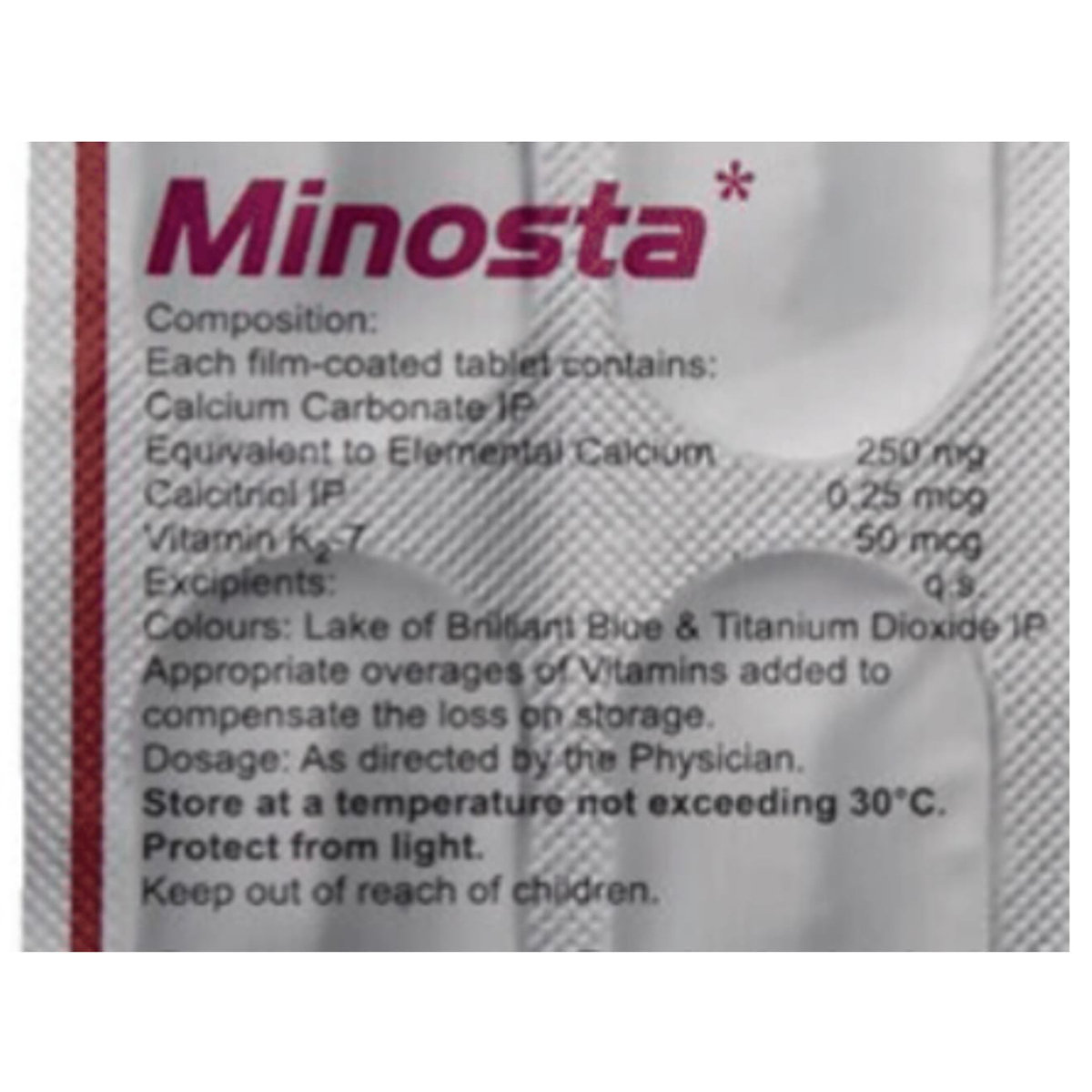
MRP ₹128
(Inclusive of all Taxes)
₹19.2 Cashback (15%)
MINOSTA TABLET is used to treat low blood calcium levels. It effectively treats various conditions caused by low calcium levels in the body, such as osteoporosis (weak and brittle bones), osteomalacia/rickets (weak bones), hypoparathyroidism (low levels of parathyroid hormone), and latent tetany (a muscle disease with low blood calcium levels). It can also be given to pregnant, nursing, and postmenopausal women to ensure that they are getting enough calcium. It provides essential nutrients to maintain bone formation and maintenance. Also, it treats calcium deficiency with hypoparathyroidism (the parathyroid glands' decreased activity) and metabolic bone diseases in people with chronic kidney failure. It raises Vitamin D levels, thereby increasing calcium levels in the blood. It helps to maintain bone density by promoting calcium transport from the bloodstream into the bone. In some cases, it may cause side effects like constipation or stomach upset, nausea, vomiting, loss of appetite, mood changes, weakness, tiredness, fast or pounding heartbeat, bone/muscle pain, and headache.
Know Your Delivery Time
Provide Delivery Location

Secure Payment

India's Most Trusted Pharmacy

Genuine Products
Manufacturer/Marketer :
Consume Type :
Return Policy :
Expires on or after :
About MINOSTA TABLET
MINOSTA TABLET is used to treat low blood calcium levels. It effectively treats various conditions caused by low calcium levels in the body, such as osteoporosis (weak and brittle bones), osteomalacia/rickets (weak bones), hypoparathyroidism (low levels of parathyroid hormone), and latent tetany (a muscle disease with low blood calcium levels).
MINOSTA TABLET consists of Calcium, Calcitriol, and Menaquinone. Calcium provides essential nutrients to maintain bone formation and maintenance. Calcitriol raises Vitamin D levels and thereby increases calcium levels in the blood. Menaquinone helps to maintain bone density by promoting calcium transport from the bloodstream into the bone.
MINOSTA TABLET can cause side effects such as constipation, stomach upset, nausea, vomiting, loss of appetite, mood changes, weakness, tiredness, a fast or pounding heartbeat, bone/muscle pain, and headache. Most of these side effects do not require medical attention. However, if these side effects persist, please consult your doctor.
If you are known to be allergic to MINOSTA TABLET or its inactive components, please inform your doctor. Please tell your doctor if you have hypercalcemia (high calcium levels), hypervitaminosis D (high vitamin D levels), and malabsorption syndrome (difficulty absorbing nutrients from food). Pregnant or breastfeeding women should consult their doctor before taking MINOSTA TABLET.
Uses of MINOSTA TABLET
MINOSTA TABLET is used to treat low blood calcium levels. The detailed uses of MINOSTA TABLET are as follows:
- Osteoporosis: MINOSTA TABLET helps strengthen weak and brittle bones by enhancing calcium absorption.
- Osteomalacia/rickets: MINOSTA TABLET treats abnormalities and softening of the bones due to a lack of calcium and vitamin D.
- Hypoparathyroidism: MINOSTA TABLET manages low calcium levels resulting from reduced parathyroid hormone production.
- Latent tetany: MINOSTA TABLET prevents and reduces the chances of muscle spasms and cramps due to low blood calcium.
- Calcium deficiency in the elderly: MINOSTA TABLET promotes bone health and lowers the risk of fractures in older adults.
- Pregnancy and lactation: MINOSTA TABLET helps meet increased calcium and vitamin D requirements during pregnancy and nursing.

Have a query?
Directions for Use
- Take MINOSTA TABLET with or without food as advised by your doctor.
- Follow your doctor’s recommendations on the dosage and timing of this medication to achieve optimal results.
- Swallow MINOSTA TABLET as a whole with a glass of water.
- Do not crush, chew, or break it.
Medicinal Benefits
- MINOSTA TABLET is used to treat low blood calcium levels and various associated conditions caused by low calcium levels in the body.
- MINOSTA TABLET consists of Calcium (mineral), Calcitriol (Vitamin D3), and Menaquinone (Vitamin K2).
- Calcium is a mineral that helps prevent or treat calcium deficiency.
- It helps to maintain bone and teeth health.
- Calcitriol, a synthetic form of Vitamin D3, treats calcium deficiency, hypoparathyroidism (a condition where the parathyroid glands are inactive), and metabolic bone diseases in people with chronic kidney failure.
- Menaquinone, also known as Vitamin K2, helps maintain bone density by promoting calcium transport from the bloodstream into the bone. Calcium-regulating proteins are also required in the arteries.
How MINOSTA TABLET Works
Storage
What if I have taken an overdose of MINOSTA TABLET
Drug Warnings
- Let your doctor know if you are allergic to MINOSTA TABLET or its inactive components.
- Brief your medical history if you have any heart/kidney/liver/blood vessel diseases, kidney stones, sarcoidosis, Crohn's disease, Whipple's disease, achlorhydria (little or no stomach acid), low levels of bile, and phosphate imbalance.
- Calcitriol in higher doses may harm the foetus.
- Higher doses of Vitamin D than the recommended daily dose should be used in pregnant women only when advised by the doctor.
- MINOSTA TABLET may pass into the breast milk; hence, consult your doctor before taking MINOSTA TABLET if you are a breastfeeding mother.
Diet & Lifestyle Advise
- Include dairy products like milk, yoghurt, cheese or milk-based custard in your diet.
- Eat a serving of broccoli, cabbage, bok choy, spinach, and other green leafy vegetables daily.
- Snack on calcium-rich nuts like Brazil nuts or almonds.
- Sprinkle sesame seeds over your food, vegetables and salads. Sesame seeds are high in calcium.
- Avoid or reduce the intake of caffeine, soft drinks and alcohol that inhibit calcium absorption.
- Replace the meat with tofu or tempeh for extra calcium in your food.
Habit Forming
Therapeutic Class
RX
Xtracal K2 Tablet 10's
Pulse Pharmaceuticals
₹238
(₹21.42 per unit)
85% COSTLIERRX
Bon K2 Tablet 10's
Glenmark Pharmaceuticals Ltd
₹321
(₹28.89 per unit)
150% COSTLIER
Alcohol
Caution
Drinking alcohol can affect calcium absorption; hence it is advised to limit the alcohol intake while using MINOSTA TABLET.
Pregnancy
Caution
During pregnancy, use higher doses of MINOSTA TABLET than the daily dietary allowance only when advised by the doctor. Your doctor will weigh the potential risks and benefits before recommending MINOSTA TABLET.
Breast Feeding
Consult your doctor
Consult your doctor before taking MINOSTA TABLET if you are breastfeeding. MINOSTA TABLET can pass into the breast milk. If MINOSTA TABLET is used during breastfeeding, please monitor the mother and the infant's serum calcium levels.
Driving
Safe if prescribed
No interaction found/established.
Liver
Consult your doctor
Let your doctor know if you have any history of liver diseases before taking MINOSTA TABLET. Hepatic impairment/liver disease can alter the metabolic and therapeutic activity of certain Vitamin D forms.
Kidney
Consult your doctor
It is advised to seek a doctor's advice before starting MINOSTA TABLET if you have kidney diseases like kidney stones or are undergoing dialysis.
Children
Consult your doctor
The doctor will decide the dosage of MINOSTA TABLET based on the child's age and weight.
Heart
Consult your doctor
Limited information available for use of MINOSTA TABLET in heart patients. Please consult your doctor.
Geriatrics
Caution
MINOSTA TABLET should be given with caution in elderly patients. Seek medical advice before using MINOSTA TABLET.
FAQs
MINOSTA TABLET is used to treat low blood calcium levels. MINOSTA TABLET effectively treats various conditions caused by low calcium levels in the body, such as osteoporosis (weak and brittle bones), osteomalacia/rickets (weak bones), hypoparathyroidism (low levels of parathyroid hormone), and latent tetany (a muscle disease with low blood calcium levels).
MINOSTA TABLET is a dietary supplement that treats low levels of calcium in the blood. It consists of Calcium, Calcitriol, and Menaquinone. Calcium is a mineral and prevents or treats calcium deficiency. Calcitriol, a synthetic form of Vitamin D3, treats calcium deficiency with hypoparathyroidism (the decreased activity of the parathyroid glands). Menaquinone (Vitamin K2) maintains bone density by promoting calcium transport from the bloodstream into the bone.
If you miss a dose, take it as soon as you remember. However, if it is time for the next scheduled dose, skip the missed dose and follow your usual dosage.
Milk is considered to be the best source of calcium. You can take MINOSTA TABLET with milk.
MINOSTA TABLET can cause kidney stones due to excess calcium deposition when used for a prolonged period. Please consult your doctor before taking MINOSTA TABLET as a daily supplement if you have any kidney problems or a history of kidney stones.
MINOSTA TABLET is used to increase low calcium levels in the body. Hence, it is not advised to use MINOSTA TABLET during hypercalcemia since it causes an overdose of calcium, leading to kidney stones and other effects.
Calcitriol in MINOSTA TABLET can increase inorganic phosphate levels in serum; hence, it should be used cautiously in patients undergoing dialysis to maintain adequate phosphorus levels and avoid ectopic calcification (calcium deposition). It is advised to follow a low-phosphate diet to control serum phosphorus levels in patients undergoing dialysis.
Take MINOSTA TABLET as advised by the doctor, preferably after a meal.
MINOSTA TABLET can cause side effects like constipation or stomach upset, nausea, vomiting, loss of appetite, mood changes, weakness, tiredness, fast or pounding heartbeat, bone/muscle pain, and headache. If these side effects persist or worsen, please consult your doctor.
MINOSTA TABLET is a combination medicine containing supplements that aid bone health.
The key ingredients in MINOSTA TABLET are calcium (mineral), calcitriol (Vitamin D3), and menaquinone (Vitamin K2).
MINOSTA TABLET increases calcium levels in the blood and maintains bone density by promoting the transport of calcium from the bloodstream into the bone.
MINOSTA TABLET can be taken by people who have low calcium levels and bone problems. Please consult the doctor; your doctor will recommend MINOSTA TABLET based on your condition.
A low phosphate diet is recommended to control serum phosphorus levels in patients undergoing dialysis. Clinical monitoring of serum electrolyte concentrations and cardiac function is recommended. Drinking alcohol can affect calcium absorption; hence it is advised to limit the alcohol intake while using MINOSTA TABLET.
Country of origin
Manufacturer/Marketer address
In the Spotlight
Disclaimer
Author Details
We provide you with authentic, trustworthy and relevant information
Buy best Health & Nutrition products by
SPECIALITY SUPPLEMENTS
Minerals
VITAMINS AND MINERALS
VITAMINS
ADULT NUTRITION
OTHER SUPPLEMENTS
Protein Supplements
OMEGA & FISH OIL
WEIGHT LOSS
KIDS NUTRITION
SEXUAL HEALTH SUPPLEMENTS
BONE & JOINT SUPPLEMENTS
AMINO ACIDS
WELLNESS DRINKS
WEIGHT GAIN
WOMEN HEALTH SUPPLEMENTS
SINGLE VITAMIN
HEALTH FOODS
IMMUNE HEALTH SUPPLEMENTS
MULTIVITAMINS
CARDIAC SUPPLEMENTS
GASTRIC DISORDERS SUPPLEMENTS
WEIGHT LOSS AND WEIGHT GAIN
Others
AYUR
HIMALAYAN ORGANICS
WELLBEING NUTRITION
HEALTHVIT
HORLICKS
GNC
PURE NUTRITION
MUSCLEBLAZE
ENSURE
FAST&UP
PATANJALI
PROTINEX
SHELCAL
Optimum Nutrition
SUGAR FREE
Pediasure
CENTRUM
PROHANCE
SWISSE
APOLLO PHARMACY
PENTASURE
Himalaya
RITEBITE
GROVIVA
Muscletech
OZIVA
QNT
APOLLO LIFE
COMPLAN
THE VITAMIN COMPANY
VOGUE WELLNESS
BEAUTYWISE
NEAT
BODYWELL
CUREVEDA
REVITAL
CELEVIDA
ORIGIN
RASAYANAM
THE GOOD BUG
HEALTHKART
CALCIMAX
BOURNVITA
EQUAL
HEALTH OK
ESSENTIAL
ISOPURE
ULTRA
WEST COAST
B-PROTIN
MAXVIDA
GALACT
HEALTHYR-U
NESTLE RESOURCE
NEUHERBS
PRESURE
SUPRADYN
THE WHOLE TRUTH
A TO Z
ARTH
Diataal
INJA
MAXIRICH
NUTRASWISS
Power Gummies
VIVAMOM
ZINCOVIT
BAIDYANATH
Cipcal
ESPERER
ORGANIC INDIA
TORGEM
ULTRA D3
ZANDU
ZEST
BOOST
CALIBAR
ECOPROT
FITSPIRE
IN YOU
Livogen
MY FITNESS
Performance Inspired
THREPTIN
BIOVIT
CHARAK
ENERZAL
Evion
FRESUBIN
LACTARE
LAMINO
MACPROT
MANNA
NURTURE
OSTOCALCIUM
PRO-PL
PROTOTAL
VIDAVANCE
Amocare
Vlado Sky Enterprise Pvt Ltd
Sun Pharmaceutical Industries Ltd
Intas Pharmaceuticals Ltd
Abbott India Ltd
Macleods Pharmaceuticals Ltd
Alkem Laboratories Ltd
Mankind Pharma Pvt Ltd
West Coast Pharmaceuticals Pvt Ltd
Emcure Pharmaceuticals Ltd
Lupin Ltd
Meyer Organics Pvt Ltd
Eris Life Sciences Ltd
Nutritionalab Pvt Ltd
Akumentis Healthcare Ltd
Torrent Pharmaceuticals Ltd
Cipla Ltd
Alniche Life Sciences Pvt Ltd
British Biologicals
La Renon Healthcare Pvt Ltd
Micro Labs Ltd
Leeford Healthcare Ltd
Zuventus Healthcare Ltd
Pharmed Ltd
Corona Remedies Pvt Ltd
Dr Reddy's Laboratories Ltd
East West Pharma India Pvt Ltd
Modi Mundipharma Pvt Ltd
Bright Lifecare Pvt Ltd
ABBOTT HEALTHCARE PVT LTD
Koye Pharmaceuticals Pvt Ltd
Apex Laboratories Pvt Ltd
Aristo Pharmaceuticals Pvt Ltd
Indchemie Health Specialities Pvt Ltd
Zydus Healthcare Ltd
DR Johns Lab Pharma Pvt Ltd
Bioceutics Inc
Hindustan Unilever Ltd
Vasu Organics Pvt Ltd
Fourrts India Laboratories Pvt Ltd
Zydus Cadila
Alembic Pharmaceuticals Ltd
USV Pvt Ltd
Elder Pharmaceuticals Ltd
ZYDUS WELLNESS LIMITED
FDC Ltd
Herbs Nutriproducts Pvt Ltd
Morepen Laboratories Ltd
Guardian Healthcare Services Pvt Ltd
Indoco Remedies Ltd
Zee Laboratories Ltd
TTK Healthcare Ltd
Troikaa Pharmaceuticals Ltd
Pulse Pharmaceuticals
Raptakos Brett & Co Ltd
Innovcare Life Sciences Pvt Ltd
Levin Life Sciences Pvt Ltd
Cadila Pharmaceuticals Ltd
Glanbia Performance Nutrition India Pvt Ltd
Linux Laboratories Pvt Ltd
Ajanta Pharma Ltd
Primus Remedies Pvt Ltd
Wockhardt Ltd
Medley Pharmaceuticals Ltd
Sanofi India Ltd
Wanbury Ltd
Adonis Laboratories Pvt Ltd
Hexagon Nutrition Pvt Ltd
Kepler Healthcare Pvt Ltd
Tablets India Ltd
Tas Med India Pvt Ltd
Aareen Healthcare Pvt Ltd
Cadila Healthcare Ltd
Medishri Healthcare Pvt Ltd
Overseas Health Care Pvt Ltd
Radicool Pharmaceuticals Pvt Ltd
Sanatra Healthcare Ltd
Daris Biocare
Elbrit Life Sciences Pvt Ltd
Maxamus Pharma Pvt Ltd
Ordain Health Care Global Pvt Ltd
Panacea Biotec Ltd
Procter & Gamble Health Ltd
Anglo French Drugs & Industries Ltd
Icarus Health Care Pvt Ltd
Nutricia International Pvt Ltd
Patanjali Ayurved Limited
Biovitamins Pvt Ltd
Klm Laboratories Pvt Ltd
Mova Pharmaceutical Pvt Ltd
Ozone Pharmaceuticals Ltd
Signova Pharma
Cachet Pharmaceuticals Pvt Ltd
Med Manor Organics Pvt Ltd
Akesiss Pharma Pvt Ltd
Delcure Life Sciences Ltd
Femura Pharmaceuticals Pvt Ltd
Hs Aldem Healthcare
Ipca Laboratories Ltd
Lincoln Pharmaceuticals Ltd
Lloyd Healthcare Pvt Ltd
SPECIALITY SUPPLEMENT
CALCIUM
Specialty Supplements
VITAMIN D
IRON
VITAMIN B12
VITAMIN B
VITAMIN C
COLLAGEN
FISH OIL OMEGA
Adult Nutrition Drink
MULTIVITAMIN
ZINC
VITAMIN B9
VITAMIN E
Kids Nutrition Drink
WHEY PROTEIN
SEXUAL HEALTH SUPPLEMENT
MAGNESIUM
SPECIALITY NUTRITION DRINK
Protein Powder
VITAMIN B1
SUGAR SUBSTITUTE
Prebiotic & Probiotic
DIABETIC NUTRITION DRINK
Protein Bar
BIOTIN
WEIGHT LOSS
ENERGY DRINK
Fat Burner
PLANT PROTEIN POWDER
WOMEN & MOTHER NUTRITION DRINK
Apple Cider Vinegar
MELATONIN
Lactation Supplements
APPETITE STIMULANT
Flax seed Oil
VITAMIN A
ORS
AMINO ACID
Pregnancy Supplements
Ashwagandha
Meal Replacement
POTASSIUM
Pre Workout
Shilajit
VITAMIN B6
L-Carnitine
VITAMIN K
CURCUMIN
Mass Gainer
CREATINE
Cod Liver Oil
Ayurvedic Capsules
VITAMIN B5
ARGININE
Glutathione
VITAMIN B2
COENZYME Q10
Chromium
Women Nutrition
MILK THISTLE
VITAMIN B3
Appetite Suppressant
Ayurvedic Tablets
Chyawanprash
Kids Gummies
MORINGA
L-Glutamine
SPIRULINA
GARCINIA CAMBOGIA
HERBAL JUICE
Instant Food
WEIGHT GAINER
ALPHA-LIPOIC ACID
DISKETTE
GLUCOSAMINE
GOKSHURA
Tulsi
ANTACID
BCAA Protein Powder
Brahmi
Chocolate
GILOY
NEEM
NUTRITION DRINK
SELENIUM
TRIPHALA
Amla
BREAKFAST CEREAL
GREEN TEA
Honey
IMF STAGE-2
MILKSHAKE
PAIN RELIEF TABLET


